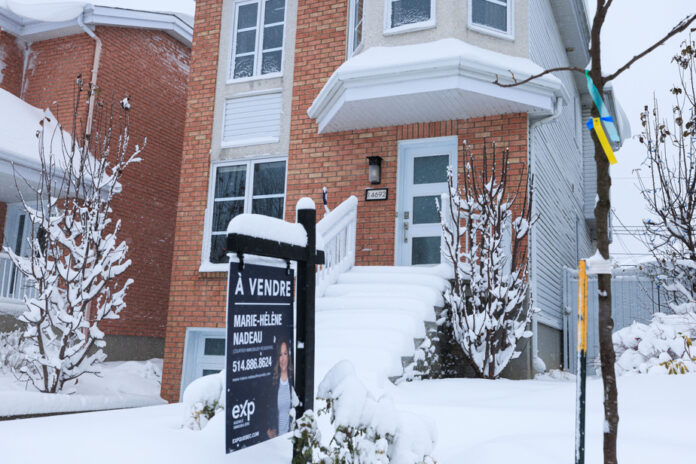The largest price drops in recent history in Toronto, fewer transactions and even the resurgence of foreclosures do not bode well for 2024. A recent report from the RE/MAX agency predicts a second consecutive year price drops in the Queen City next year. Quebec is doing better. But for how long ?
“The average price in Canada stood at approximately $679,553 during the first three quarters of 2023, a decrease of 5.3% compared to the same period a year earlier,” writes the Canadian Mortgage and Investment Corporation. housing (CMHC), in the press release announcing its third quarter financial results. “This decline represents the largest decline in house prices in recent history. »
In addition to being the leading federal agency for residential real estate, CMHC is a major loan insurer.
CMHC analyzes resale market statistics based on transactions recorded on the MLS network of real estate brokers. Transactions between individuals as well as those concluded through internet platforms such as DuProprio are not counted.
For the first nine months of the year, resales recorded in the MLS network decreased by 14.9%, to 447,280 units, the largest drop in transactions since the mid-1990s, mentions CMHC.
These pan-Canadian data reflect first and foremost activity in the Toronto metropolitan area, specifies Charles Brant, economist for the Professional Association of Real Estate Brokers of Quebec (APCIQ) from whom La Presse asked for an opinion.
In a worrying sign, Toronto brokers have drawn public attention to the rapid acceleration in the number of foreclosures, or “repossessions,” among properties for sale.
“The number of home listings for sale presented as ‘repossession’ in October has not been higher since the 1990s. This indicates the increasing level of distress among sellers, who are unable to repay their debts. mortgage loans, and lenders forced them to sell,” wrote economist Daniel Foch in the market analysis of Agence RARE, which specializes in the pre-sale of new condo units among other things.
The economic department of TD Bank published a report on Monday which announces an additional drop in prices in metropolitan Canada in the coming months.
For its part, RE/MAX released its market outlook for 2024 on November 28. “For Peterborough and the Greater Toronto Area (GTA), we are both forecasting a slight 3% decline in average residential prices [overall of the year], while Durham Region and Grand Bend are expected to see a 5% decline,” it reads.
RE/MAX is less categorical for Quebec. “In Quebec, the average residential sales price should remain unchanged in 2024, but the market should rebalance. In the meantime, Montreal is expected to move towards a buyer’s market in 2024.”
What to understand? “The market is moving at a very slow pace, particularly in Montreal, less so throughout Quebec thanks to the Quebec CMA,” comments Charles Brant, of the APCIQ. The number of resales in Quebec and Montreal fell by 14 and 16% in one year, after 10 months in 2023.
“We’re not seeing properties come back on the market. We are in a seller’s market without sellers, he continues. The new registrations absolutely do not compare to what we are seeing in Vancouver and Toronto. There, something is really happening in a context where renewals are being made and owners are unable to renew their mortgages. House prices are twice as high in Toronto and Vancouver as in Montreal,” says Mr. Brant, who will unveil his 2024 forecasts on December 14.
“Since the nurses’ and teachers’ strikes, we have seen a drop in market activity,” says broker Philippe Charbonneau, from Marc Charbonneau’s RE/MAX team, active on the South Shore of Montreal. , in Brossard in particular. He saw a price adjustment from the market peak during the pandemic when overbidding became the norm. He says homes under $650,000 still sell relatively easily in his preferred market.
Active in downtown Montreal, broker Behrooz Davani, of the Royal LePage brand, has adjusted to the slowdown in activity. “On the marketing side, you have to be creative to be able to seek out potential buyers and give more incentives. Many buyers assume the seller’s mortgage,” he emphasizes.
The broker gives the example of a one-bedroom condo that he has just resold for $400,000 in Griffintown. “They bought it and they’re going to have a fixed rate of 1.79% for another 3 years. The property sold for that price because of the mortgage in place, otherwise the sale price would have been lower. »
Mr. Davani expects an increase in properties for sale in the coming months. He cites data from a recent Nanos survey commissioned by Royal LePage which indicates that 28% of residential mortgage holders in Quebec will have to renew their loan contract within a year and a half. Of these, 79% say they are concerned about their upcoming renewal.















